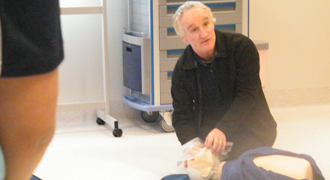
TEAM™ – Further Information
References
- Cooper S. Connell C. Cant R. Use of the Team Emergency Assessment Measure in the rating of emergency teams’ non‐technical skills: A mapping review. Emergency Medicine Australia (2023) https://onlinelibrary.wiley.com/doi/10.1111/1742-6723.14184
- McKay A, Walker ST, Brett SJ, Vincent C, Sevdalis N. Team performance in resuscitation teams: Comparison and critique of two recently developed scoring tools. Resuscitation 83 (2012) 1478– 1483
- Cooper S, Cant R, Sellick K, Porter J, Somers G, Kinsman L, Nestel D. Rating medical emergency teamwork performance: development of the Team Emergency Assessment Measure (TEAM). Resuscitation. 2010. 81. 446-452.
- Cooper S, Cant R, Porter J, Missen K, Sparkes L, McConnell-Henry T, Endacott R., Managing Patient Deterioration: Assessing Teamwork and Individual Performance. Emerg. Med. J. 2012. Published on line 19 May 2012. doi:10.1136/emermed-2012-201312
- Cooper S, Janghorbani M, Cooper G. A decade of in-hospital resuscitation: outcomes and prediction of survival. Resuscitation. 2006; 68: 231-37.
- Abella BS, Alvarado J, Myklebust H, Edelson DP, Barry A, O’Hearn N, Vanden H, Becker L. Quality of cardiopulmonary resuscitation during in-hospital cardiac arrest. JAMA. 2005; 293: 305-10.
- Cooper S, O’Carroll J, Jenkin A, Badger B. Collaborative practices in unscheduled emergency care: role and impact of the emergency care practitioner qualitative and summative findings. Emerg. Med. J. 2007; 24: 625-29.
- DeVita MA, Schaefer J, Lutz J, Wang H, Dongilli T. Improving medical emergency team (MET) performance using a novel curriculum and a computerised human patient simulator. Qual Saf Health Care. 2005; 14: 326-31.
- Thomas EJ, Taggart B, Crandell S, Lasky RE, Williams AL. Love LJ, Sexton JB, Tyson JE, Helmreich RL. Teaching teamwork during the Neonatal Resuscitation Program: A randomised trial. Journal of Perinatology. 2007; 27: 409-14.
- Ummenhofer W, Amsler F, Sutter P, Martina B, Martin J, Scheidegger D. Team performance in the emergency room: Assessment of inter-disciplinary attitudes. Resuscitation. 2001; 49: 39-46.
- Flin R, Maran N. Non-technical skills: identifying, training, and assessing safe behaviours In: H R (ed.) Manual of Simulation in Healthcare.: Oxford University Press. 2008.
- Clark P. Teamwork: Building Healthier Workplaces and Providing Safer Patient Care. Crit Care Nurs Quarterly. 2009; 32: 221-31
- Perkins GD, Boyle W, Bridgestock H, Davies S, Oliver Z, Bradburn S, Green C, Davies RP, Cooke MW. Quality of CPR during advanced resuscitation training. Resuscitation. 2008; 77: 69-74.
- Draycott TJ, Crofts JF, Ash JP, Wilson LV, Yard E, Sibanda T, Whitelaw A. Improving neonatal outcome through practical shoulder dystocia training. Obstetrics & Gynecology 2008;112:14—20.
- Fletcher G, Flin R, P. M, Glavin R, Maran N, Patey R. Anaesthetists’ Non-Technical Skills (ANTS): Evaluation of a behavioural marker system. British Journal of Anaesthesia. 2003; 90: 580-88.
- Flin R, Yule S. Leadership for safety: industrial experience. Qual. Saf. Health Care. 2004; 13.
- Flin R, Maran N. Identifying and training non-technical skills for teams in acute medicine. Qual. Saf. Health Care. 2004; 13.
- Endsley MR. Situation awareness global assessment technique (SAGAT). National Aerospace and Electronics Conference (NAECON) New York, 1988; 798-95.
- Cant R, Cooper SJ. The benefits of debriefing as formative feedback in nurse education. Australian Journal of Advanced Nursing 2011; 29(1) 37-47.. Open access At: http://www.ajan.com.au/Vol29/29-1_Cant.pdf
- Cooper S., McConnell-Henry T., Cant R., Porter J., Missen K., Kinsman L., Endacott R., Scholes J. Managing deteriorating patients: Registered nurses’ performance in a simulated setting. The Open Nursing Journal, 2011, 5: 120-126 [DOI: 10.2174/18744346011050100120]
- Endacott R, Scholes J, Cooper S, McConnell-Henry T, Porter J, Missen K, Kinsman L, Champion R. Identifying patient deterioration: using simulation and reflective review to examine decision making skills in a rural hospital. International Journal of Nursing Studies. Accepted 15/10/11. Pre-publication on line at http://dx.doi.org/10.1016/j.ijnurstu.2011.11.018
- Cooper S. Bulle B. Biro MA. Jones J.. Miles M. Gilmour C. Buykx P. Boland R. Kinsman L. Scholes J. Endacott R. Managing women with acute physiological deterioration: student midwives performance in a simulated setting. Women and Birth. Accepted 25/8/11 Pre-publication on line at http://www.sciencedirect.com/science/article/pii/S1871519211002125
- Buykx, P., Kinsman, L., Cooper, S., McConnell-Henry, T., Cant, R., Endacott, R. & Scholes, J. FIRST2ACT: Educating nurses to identify patient deterioration – a theory-based model for best practice simulation education. Nurse Education Today, 2011. 31(7), 687-693
- Endacott R. Cooper S. Scholes J. Kinsman L. McConnell-Henry T. Final-year nursing students’ ability to assess, detect and act on clinical cues of deterioration in a simulated environment. Journal of Advanced Nursing. 2010. 66(12), 2722–2731
- Cooper S. Kinsman L. Buykx P. McConnell-Henry T. Endacott R. Scholes J. Managing the Deteriorating Patient in a Simulated Environment: Nursing Students’ Knowledge, Skill, And Situation Awareness. Journal of Clinical Nursing. 2010; 19(15), 2309-2318.
- Brown D, Chronister C. The Effect of Simulation Learning on Critical Thinking and Self-confidence When Incorporated Into an Electrocardiogram Nursing Course. Clinical Simulation in Nursing. 2009; 5: 45-52.
- Moorthy K, Munz Y, Adams S, Pandey V, Darzi A. A human factors analysis of technical and team skills among surgical trainees during procedural simulations in a simulated operating theatre. Ann Surg. 2005; 242: 631-39.
- Cooper S & Wakelam A. Leadership of Resuscitation Teams: ‘Lighthouse Leadership’. Resuscitation, 1999. 42, 27-45.
- Cooper S. Leadership Training – An investigation of the effectiveness of a leadership training programme incorporated into the UK Advanced Life Support Course. Resuscitation, 2001. 49, 33-38
- Cooper S, Bradbury M, Blakely G. Expert clinical examiner’s decision processes in Objective Structured Clinical Examinations (OSCEs); is intuition a valid and reliable decision strategy? International Journal of Clinical Skills. 2009. 3(3):140-146.